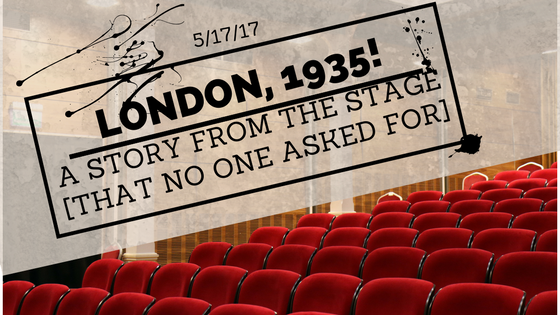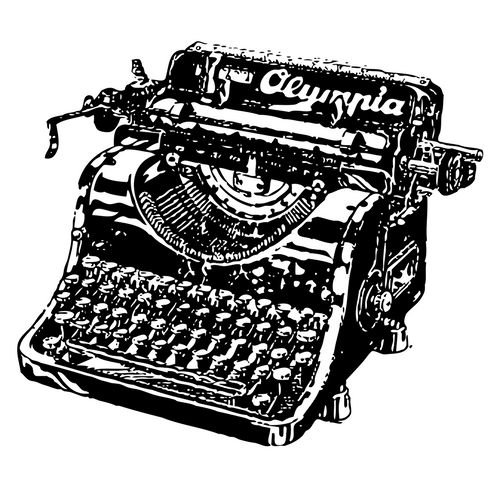|
In my defense, it was a very hot day. It’s important that you remember that. Weathervane Playhouse’s main theatre was climate-controlled, but it was still remarkably warm, especially if you happened to be onstage behind the red curtain wearing a vintage three-piece suit, which is precisely where I was at the time, clad in just such a suit. I was seated (jauntily, it must be said) in a plush armchair on wheels, and for reasons I will explain shortly, I was sitting under a white sheet, which covered both me and the armchair. This did nothing to help the heat. In one hand, I held a glass of iced tea, which looks like Scotch from stage, and in the other hand I held an unlit cigar. Beside me sat a side table with a lamp. This side table was also on wheels. Everything was set for the start of a play called The 39 Steps, a parody of the Hitchcock film of the same name, a 1930s spy thriller set in England. Here was the plan. As the play began, the curtain would be drawn back, trumpets would blare, and the sheet would be dramatically whipped off the armchair, just as I launched into an epic opening monologue with the words, “London, 1935!" As I spoke this monologue, in a flawless British accent, the chair and the side table would be slowly pushed forward towards the edge of the stage, imitating the slow motion close-ups used in films (hence, the wheels). The people who were to do the pushing, my cast mates, Matt and Carlos, stood ready, one behind my chair, and the other behind the side table. At least, I assume they stood ready. I, as you'll remember, was seated under the aforementioned sheet and could see nothing. When a play is to begin, in case you are unaware, the stage manager, whose job it is in part to wrangle the actors, comes to the dressing room and calls out, “Places!" This means the actors should take their positions for the start of the play. This is both a formality and a necessity. Actors are people, after all, full of flaws and foibles, and we are not necessarily to be trusted with knowing when to be where. Our stage manager had already called places, and that is why we were all dutifully at the ready. After the actors are at places, the stage manager heads to the booth and calls for the show to begin. Before the show starts, lights are dimmed, and often a curtain speech is made, wherein someone greets the audience, informs them of the rules of the room, and emphasizes that all cellphones are to be silenced on pain of death, perdition, and Dante-esque levels of entirely justifiable eternal stress and suffering. These days, this speech is often a recorded announcement, short and to the point, but sometimes, at smaller theatres, the curtain speech is given live by someone like the Artistic Director of that theatre. This latter, live option was how the curtain speeches were done at the Weathervane Playhouse. Six years have passed since that summer, and I honestly don’t remember many details about these particular curtain speeches. But I do remember they were significantly longer than you would wish them to be when you were standing or sitting at places, waiting for the show to start. The audience, no doubt, needed to hear all these details (now forgotten by me) about the snacks available in the lobby, and the exciting other shows on offer that season, but we behind the curtain, at places, waiting to begin the performance, had heard it all before. Really, to us, these speeches couldn’t be short enough. On the night of our story, I sat under that sheet, at places, waiting, for a particularly long time. It’s important to emphasize that. And, I must insist, in my defense, that we all remember that it was a very hot day, and that it was very warm under that sheet. One final note. Weathervane Playhouse was (and still is) a summer stock theatre, which means that we performed one show at night, while we rehearsed the next show during the day. On the night in question, my cast and I were performing The 39 Steps, but our day had been spent busily rehearsing Big River, a truly beautiful and, it must be stated, possibly overly long musical adaptation of The Adventures of Huckleberry Finn. In it, I played the Duke, part of a conniving duo of confidence tricksters who, as you would expect, filled their stage time by taking advantage of dupes. The Duke, played by me, spoke in a Southern accent, because everyone in Big River speaks in a Southern accent, because it takes place in the American South. Remember this, because it’s important. And so, there we all were. There I sat, in a heavy woolen suit, exhausted after a long day’s rehearsing, hidden under a sheet in a comfortable chair. It really had been a long, hot day, and it was very warm and still under that sheet. You can probably guess what happened next. You’re right. I fell asleep. The next thing I knew, there was a grand blare of trumpets and the sheet was rudely, if dramatically, ripped from my head. I awoke with a start and launched confidently into my line, grateful that I remembered where I was and which line to say, and that I had not, in my slumber, spilled the fake Scotch. "London!" I cried, "1935!" And yet, something was wrong. In my awakening haste, I had, understandably, if now famously, reverted to the SOUTHERN ACCENT which I was presently using during my daytime rehearsals. I had just yelled, "London, 1935!" in as hillbilly an accent as it has ever been uttered in. In that moment, Alfred Hitchcock rolled over in his grave, which is no small feat for man who was, in life, quite remarkably rotund. But if in that moment Hitchcock was rolling, my fellow cast mates were also pushing, pushing me irrevocably towards the edge of the stage, just as we had rehearsed and performed countless times before, shaking with laughter as they did so. It was completely understandable, but it did nothing to bring me comfort in my distress. I don't know if you are the sort of person who “does” accents. I don't know a thing about you. Who are you? How did you happen upon this blog? But if you do happen to be an American, and more specifically an American with a relatively standard, middle-of-the-road accent like myself, you know that it takes some effort to adopt a more interesting accent. It has also been noted by the sorts of people who make a habit of doing accents that Southern American and standard British, or "Received Pronunciation" as the snobs call it, are not without a sort of similarity. You may try both now if you wish and are able. Perhaps you will agree with me. However, I mention this last point to you only to say that it is devilishly hard to switch from one to the other once you have one going -- especially if you have just woken up, and have launched into one of the accents completely by accident. You hear that the sounds are wrong, but it's a hell of a thing to try to jump lightly from one to the other, laughing off the mistake. I could clearly hear that the sounds were wrong. I knew it. And yet, the fanfare continued its fanning, and my friends, pushing me on, continued to howl with controlled mirth, and I, poor fool that I was, continued my speech, slowly and awkwardly morphing from a Southern huckster to a cool British gentleman throughout the entirety of my now somewhat soiled opening speech. I was saved, I think, in part by the fact that the trumpets were quite loud and that most people who see theatre (in America, at any rate) are quite old and hard of hearing. In any event, everyone in the audience was quite kind, and no one mentioned my gaff at the end of the show. Of course, these were the very first lines of the show, and by the time an audience has hacked their way through the confusion inherent in the start of a show, and maneuvered through two whole acts to the end, they have probably forgotten most of it anyway. At least, that’s what I tell myself after a significant misstep on the stage. My friends have never let me live the moment down. And nor should they.
0 Comments
Leave a Reply. |
AuthorPhilip David Black is an actor, educator, voice over artist, and blog author. Someday he may write books. Until then, he blogs . Archives
June 2018
Categories |


 RSS Feed
RSS Feed